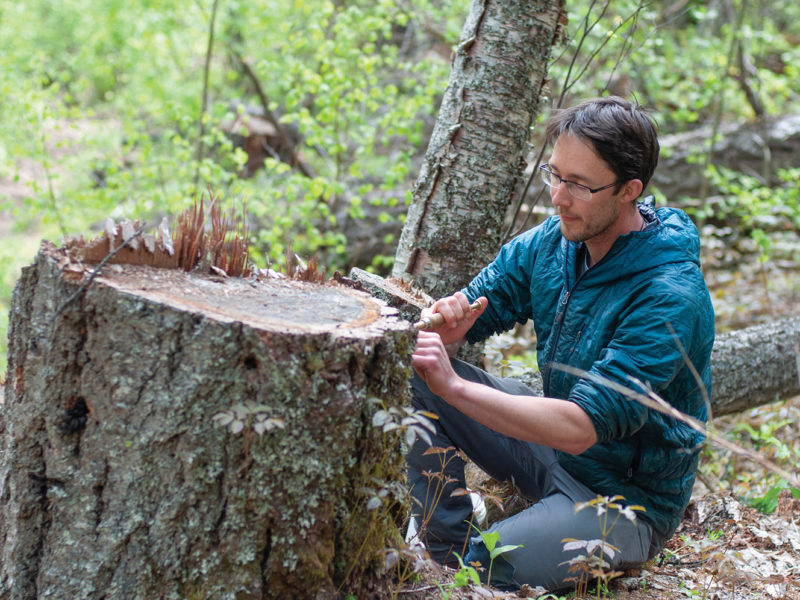KASLO – They may not be ready to harvest until 2022 but mushrooms may soon catch the eye of hikers along Kaslo’s Wardner Trail.
A project to combine forestry and food production championed by Robin Mercy, owner of Mr. Mercy’s Mushrooms, saw the Village of Kaslo grant permission for Mercy to inoculate stumps and logs with Phoenix oyster mushrooms.
“I thought, let’s just do some research here, and see if it can grow in an unaided way,” says Mercy.
He usually grows mushrooms on hardwood, but this variety grows well on Douglas fir, which was among species recently cut by the Kaslo and District Community Forest Society on village land as part of wildfire mitigation efforts and to fight fir beetle.
In early May, Mercy and his employee drilled holes in the fallen wood and injected fungi, sealing the holes with beeswax. The waiting game is now on, as Mercy will eventually determine if the fungi fruits and, if it does, how well it fruits.
If the low-tech methods are effective, the potential to team up the forestry and agriculture industries is vast, particularly if forestry waste, such as logs and stumps, can be utilized.
“It’s trying to work more with what we have here,” says Mercy.
Not a new concept
The concept of growing food in the wild isn’t new to BC, according to a recent study by Simon Fraser University historical ecologists, which examined the diversity of ancient Indigenous forest gardens developed by the Ts’msyen and Coast Salish. Still growing today at archaeological sites, the gardens include fruit and nut trees, root foods and medicinal plants, among others.
Whatever the outcome in the forest, mycology is now a way of life for Mercy, who was raised in Argenta, at Kootenay Lake’s north end, and whose formal education is in music composition.
“‘Farmer’ was never a career path,” says Mercy. “I feel I come from a very homesteading background. … We always ate mostly from own garden. I experienced producing my own food, and never considered it on a commercial scale.”
The 33-year-old didn’t forage for mushrooms when he was young, but in his 20s as a tree planter and crew boss, he began carrying guidebooks to help him identify plants and mushrooms.
“I always got really excited whenever I would find wild mushrooms,” says Mercy. “They’re so mysterious. The same patch of ground looks totally bare 90% of the time –when the right conditions occur, you have mushrooms popping up. You have no idea what’s here unless you’re intensely studying that patch of land.”
During a break from work, Mercy took a cultivation course in Eugene, Oregon, which led to a month-long internship in 2016 at What the Fungus, a gourmet mushroom grower in Summerland. There, he learned about the specialty mushroom business from growing to marketing.
With his first son on the way in 2017, Mercy wanted steady home-based work. He launched the business, which grew to become his full-time job two years ago. He now harvests about 30 pounds of organic mushrooms daily from fruiting chambers on his two-acre property, which also houses a 500-square-foot laboratory – fitting for a self-proclaimed “lifelong nerd.”
“It’s the nerdiest form of farming you can imagine,” says Mercy. “I’m using a scalpel and working in a clean room, and putting cuttings onto Petri dishes. It’s precision work in a lot of ways, and that really appeals to me.”
So does the region’s foodie culture, which guarantees home cooks and restaurateurs will be more interested in specialty mushrooms than the typical white button, crimini and portobello mushrooms Mercy offers. The less common oyster, shitake and lion’s mane mushrooms have remained unchanged through millennia of agriculture.
“Humans haven’t been changing these species from what they are in nature at all,” he says.
The low-tech method he’s experimenting with in the forest will help bring production a bit closer to nature, avoiding the pasteurized sawdust and single-use plastics his regular operation uses.
“They grow on stumps and logs and trees in natural habitat,” he says. “We can start on a small scale, and move toward that as a production model.”
He hopes they’ll inspire mushroom lovers at the same time.
“Mushrooms really capture people’s imagination,” he says. “It kind of brings the idea of using mushrooms in this way to the forefront of people’s imaginations.”


 BC fairs await reopening
BC fairs await reopening